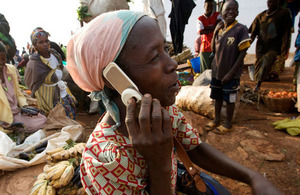#MWC16: UK and GSMA partner to fight global poverty using Mobile Technology

The United Kingdom (UK) and GSMA , a body that represents the interests of mobile operators worldwide have announced a new partnership that will see them use mobile technology to fight poverty across the globe.
Under this partnership, the UK’s Department for International Development (DFID) will provide financial support to develop and roll out new technologies that can improve response to natural disasters, help women obtain financial services and boost access to safe water and clean energy across the developing world.
According to the two partners, the partnership will make significant contributions to nine of the Global Goals including ending extreme poverty, promoting decent work and economic growth, innovation and infrastructure, affordable and clean energy, clean water and sanitation and addressing gender inequality.
“Over the last decade the UK has been at the forefront of bringing the battle against extreme poverty into the digital era. With more people in developing countries using mobiles than ever before, this partnership with the GSMA and its members will increase access to banking services, especially for women, bring access to energy to many for the first time and even vital health information,” Nick Hurd, UK International Development Minister said.
“We have a real opportunity to accelerate the development of mobile technologies that can save lives, help women reach their potential and boost the growth of emerging economies for Britain to trade with. A more prosperous, connected and stable world is firmly in our national interest.”
Mobile technology has given a voice to those otherwise cut off from the world during cataclysmic events, especially in Africa which has recorded an increased number of mobile phone users in recent times. People are now able to share their plight using mobile communication through text, voice, and, most importantly, images, and bring about real change.
“Through our Mobile for Development team, the GSMA has a proven track record in delivering life-enhancing mobile solutions at scale, in critical areas such as mobile money, health and nutrition, agriculture, utilities and many others,” Mats Granryd, Director General of the GSMA added. “We welcome the opportunity to partner with DFID to bring the power of mobile to our shared objectives of reaching the underserved and delivering on the Global Goals.”
In 2005, DFID provided initial seed funding for MPesa, a ground-breaking mobile money transfer and banking system that has revolutionised financial service provision in Africa and spurred the development of mobile money around the world. The firm has also over the past three years worked with GSMA to deliver mobile-based solutions for people in the developing world, including: ReadyPay Solar, that allows thousands of people in Uganda to pay for small-scale solar electricity in their homes through their mobile phone. It is estimated that power outages cost developing countries 1-2 per cent of their GDP annually. Through PEG Ghana, mobile technology has also helped 2.5 million people access solar power. SweetSense Sensors has also improved access to clean water in Rwanda.
DFID says the extended partnership builds on its previous work supporting mobile technology to drive development. For instance in 2005, DFID provided initial seed funding for MPesa, a ground-breaking mobile money transfer and banking system that has revolutionised financial service provision in Africa and spurred the development of mobile money around the world.



